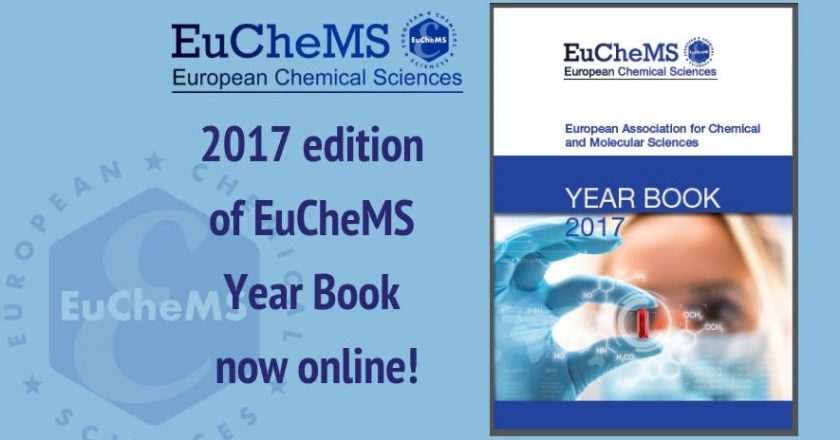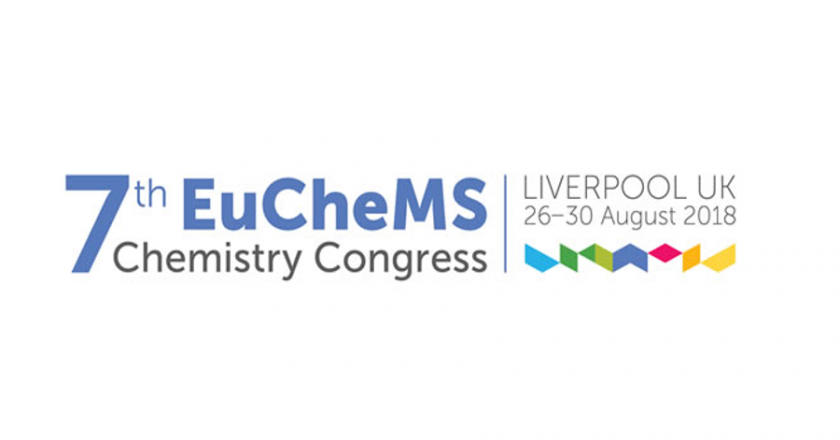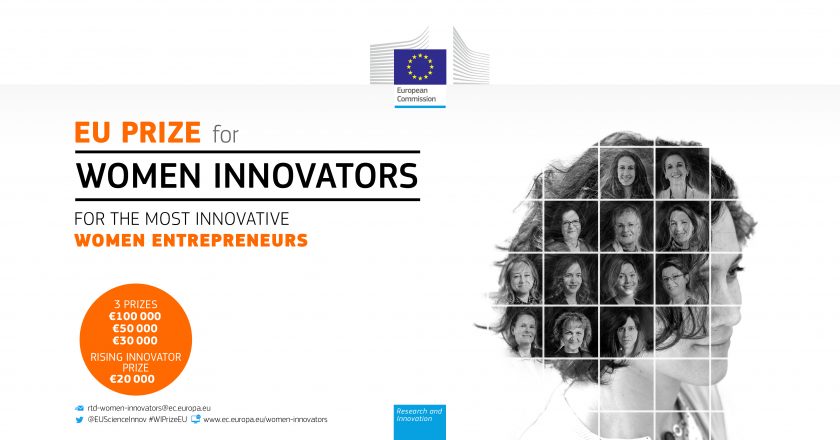The EuCheMS 2017 Year Book is now available online! Download it for an insightful overview of EuCheMS Professional Networks, policy initiatives, conferences, events and much, much more!

The EuCheMS 2017 Year Book is now available online! Download it for an insightful overview of EuCheMS Professional Networks, policy initiatives, conferences, events and much, much more!

26 – 30 August 2018
Liverpool, UK
Website: https://www.euchems2018.org/
20 – 22 April 2018
Prague, Czech Republic
Website: http://old.vscht.cz/lam/ECTN/GAPrague.htm
20 March 2018
Brussels, Belgium
Website: https://ec.europa.eu/info/events/innovation-and-cultural-heritage-2018-mar-20_en
17 – 26 June
Ghent, Belgium
Website: http://www.isiem2018.org/
10 – 14 June
Gargnano, Italy
Website: http://corbellasummerschool.unimi.it/
4 – 7 June
Prague, Czech Republic
Website: http://www.iis-prague2018.cz/
13 – 17 May
Rome, Italy
Website: https://rome.setac.org/
10 – 12 May 2018
Hannover, Germany
Website: http://bit.ly/2HmGIif
2 – 4 May 2018
Porto, Portugal
Website: https://www.fc.up.pt/spe2018/
10 – 12 April 2018
München, Germany
Website: https://veranstaltungen.gdch.de
8 – 11 April 2018
Gargnano, Italy
Website: http://www.isprochem.unimi.it/
Deadline: 30 April 2018
Website: http://www.euchems.eu/new-award-euchems-historical-landmarks/
Deadline: 26 April 2018
Website: http://bit.ly/2CMDUbB
Deadline: 22 March 2018
Website: http://bit.ly/2iv7zC6
Deadline: 28 March 2018
Website: http://www.eurekanetwork.org/
Deadline: Continuous Open Call
Website: http://ec.europa.eu/
In 2017, the European Commission (EC) carried out a review of its 2012 EU Bioeconomy Strategy (SWD(2017)374). The review concluded that the Strategy, whose initial aim was to ”pave the way to a more innovative, resource-efficient and competitive society that reconciles food security with the sustainable use of renewable resources for industrial purposes, while ensuring environmental protection”, is delivering on its key aims and that the role of the bioeconomy is increasingly being recognised in Europe.
Click here for more information and to submit your feedback before 20 March 2018.
The EU emissions trading system (ETS) after 2020 foresees the establishment of the Innovation Fund to accelerate the commercialisation of low-carbon technologies. 400 million allowances will be reserved from 2021 onwards for this purpose. In addition, a further 50 million of unallocated allowances from 2013-2020 will be added, together with, as early as 2019, any possible un-used or remaining funds from the NER 300 Programme.
The Fund will support innovation in low-carbon technologies, processes and products in industrial sectors and should stimulate the construction and operation of projects that aim at the environmentally safe capture, use of CO2 (CCU) and its geological storage (CCS), as well as innovative renewable energy and energy storage technologies in the territory of the European Union. Technologies receiving support should not be commercially available yet, but shall be sufficiently mature to be ready for demonstration at pre-commercial scale.
This public consultation will gather the views of the wider public on additional, more detailed, design elements of the Innovation Fund, as an input to the Impact Assessment accompanying the Commission’s proposal for a delegated act.
Deadline: 10 April 2018
Source and access to the consultation: https://ec.europa.eu/clima/consultations/public-consultation-establishment-innovation-fund_en
The European Commission is consulting on the EU rules for products used in the construction of buildings and infrastructure works.
The Construction Products Regulation (CPR) aims to make the single market work for products used in the construction of buildings and infrastructure. However, a number of sources have identified issues affecting the functioning of the CPR (such as the need for clarification regarding simplification provisions, limited evidence of uptake of simplification provisions/lighter regimes by micro enterprises, the link with Regulation 1025/2012 on standardisation and mandatory use of standards in the CPR, and more).
This public consultation aims to give all interested citizens and stakeholders the opportunity to contribute to the exercise and give their views on key issues relevant for the evaluation and impact assessment. In providing this opportunity, this consultation supplements previous, more targeted consultations of stakeholders. The consultation will inform the Commission’s evaluation and impact assessment report and the legislative proposal accompanying the report, if the outcome of the evaluation points towards the need to change the EU rules on construction products.
Deadline: 16 April 2018
Source and access to the consultation: https://ec.europa.eu/info/consultations/public-consultation-eu-rules-products-used-construction-buildings-and-infrastructure-works_en

The names of twelve successful women entrepreneurs shortlisted for the EU Prize for Women Innovators 2018 were unveiled by Carlos Moedas, Commissioner for Research, Science and Innovation on the occasion of International Women’s Day. The European Commission’s initiative is part of a wider move to encourage more women to become innovators and entrepreneurs as they continue to be underrepresented in many areas. The criteria for the award looked at the originality and marketability of the developed products or services, their economic and societal impact, as well as the impact and leadership role of the contestants. You can meet the finalists in this short video.
On 22 and 23 February, the European Commission (EC) hosted the second edition of the EU Industry Day forum . EC Commissioner for Research, Science and Innovation, Carlos Moedas, delivered a speech in which he described the innovative changes in industry and society as resembling the propeller of a plane ‘’with three strong blades: the first is Science; the second is Start-Ups; and the third is Industry’’.
. EC Commissioner for Research, Science and Innovation, Carlos Moedas, delivered a speech in which he described the innovative changes in industry and society as resembling the propeller of a plane ‘’with three strong blades: the first is Science; the second is Start-Ups; and the third is Industry’’.
He also announced the launch of the EIC Horizon Prize on Innovative Batteries for e-Vehicles, with an award of €10 million for whoever manages to crack the challenge of developing a safe and sustainable battery for electric vehicles. Up to the task? Click here for more information.
Check out this sobering European Parliament infographic on Greenhouse Gas Emissions in the EU and the world. Why does this matter for all of us? Read EuCheMS’ past president, Professor Cole-Hamilton’s opinion piece on what global warming and its consequences mean.
Eurydice, the Education Information Network in Europe has published a new report that aims to guide policy-makers in providing efficient support mechanisms for teachers. The report covers a total of 43 European education systems (covering the EU as well as the Balkans, Switzerland, Iceland, Norway and Turkey) and delivers analyses of the different country-specific situations, career development opportunities for teachers and competence frameworks.
A recently published study in Nature Climate Change has indicated that soils can be a net sink of greenhouse gases through increased storage of organic carbon. Whilst land management practices can either accelerate the release of carbon or increase the soil’s capacity to store it, the use of fertilisers needs to be adjusted to balance additional nitrogen inputs as climate change mitigation advances can be cancelled out through higher nitrous oxide emissions from soil. The study concludes that a significant level of CO2 mitigation is achievable so long as nitrogen inputs are in turn controlled. You can take a look at the full study here. The findings are a welcome development and can contribute to the EU target to cut 20% greenhouse gas emissions by 2020 and by 40% by 2030 (both compared with emission levels of 1990).
You must be logged in to post a comment.